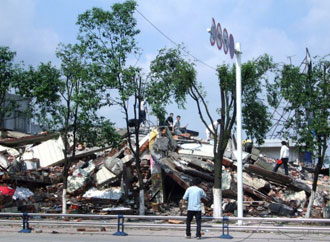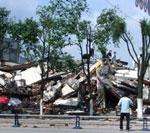MSF teams have been assessing the immediate health needs in several affected areas of Sichuan. The results from the initial assessment indicate urgent needs for shelters, drinking water, medical and sanitation supplies. Most pharmacies in the area were destroyed by the quake, and people are facing a dire shortage of medicines. Therefore, MSF is planning to send medicine and medical supplies to Chengdu.

© MSF
Earthquake death toll in southwest China’s Sichuan Province has exceeded 19,500 by Thursday, May 15, according to Chinese officials. According to reports, thousands of people remain trapped under the rubble of collapsed buildings. The epicenter is located in Wenchuan, northwest of Chengdu, capital of Sichuan province. Some 90,000 buildings have reportedly been destroyed and many areas in the mountains have not yet been accessed.
The health-care infrastructure is good in Sichuan, but some hospitals have been damaged, and services have been limited and overwhelmed by wounded. Health-care interventions have been made free of charge in this post-earthquake period. There is a referral system in place for complicated medical cases (usually from towns to cities). Surgical equipment and capacity are needed, especially for orthopedic care and anesthesia.
Two of the three Doctors Without Borders/Médecins Sans Frontières (MSF) teams (3 doctors, 1 clinical officer, 1 logistician, 1 administrator) have been assessing the immediate health needs in several affected areas of Sichuan. In Anxian, Dujiangyan, and Beichuan districts, north of Chengdu, MSF team carried out assessments. In Beichuan district alone at least 10,000 people are missing with more than 5,000 people reportedly dead. The results from the initial assessment indicate urgent needs for shelters, drinking water, medical and sanitation supplies. Most pharmacies in the area were destroyed by the quake, and people are facing a dire shortage of medicines. Therefore, MSF is planning to send medicine and medical supplies to Chengdu.
“In the assessed areas, a lot of houses have been destroyed and many people have lost their basic living conditions,” says Philip Tavernier, the MSF Head of Mission in China. “We will therefore send blankets, plastic sheeting, and hygiene kits (soap, basin, towel, toothpaste, shampoo, etc.) from Hong Kong to the affected area. These materials are meant to restore basic living conditions for about 20,000 people.” MSF is also investigating the availability of non-food items in the area such as blankets, jerry cans, plastic sheeting, and chlorine for water disinfection.
Another MSF team visited the area of Pengzhou, located about 40 km north of Chengdu. There were reportedly hundreds of injured people in two towns in the neighboring Longmen mountains, who were being referred to the local structures. The main reported urgent needs in Pengzhou are for shelter, medicine, and medical equipment.
In Chengdu itself, the MSF team assessed two hospitals, which had received hundreds of people injured in the earthquake but has a good capacity to treat the patients. However, they urgently need some specific material and equipment. MSF will donate surgical material, perfusions, dressing material, and additional drugs.
Material to carry out dialysis will also be donated in order to treat the people suffering from the so-called crush syndrome. Crush syndrome is a condition in which muscle tissue damaged by severe internal injury may release massive quantities of toxins into the bloodstream and lead to kidney failure. Left untreated, crush syndrome can be fatal. MSF is also sending three nephrologists to reinforce the treatment of the syndrome.
Some mountain roads are still blocked. Many ambulances have been seen transporting patients today (when roads are open). Chengdu airport was reopened today. At some stations, fuel is reserved for relief use. Some roads are reserved for the relief use only too. Supplies are not necessarily readily available in the country (ex., tents will be difficult to find), and will have to be transported from other provinces or countries. MSF is sending 5,000 tents from Beijing.
MSF will continue further assessment, and reinforce its teams on the ground in order to respond rapidly to unmet needs. In the next two days about 25 specialists (nephrologists, surgeons, doctors, nurses, psychologists, logisticians, and water-and-sanitation experts) should arrive in Sichuan, along with additional relief material.
MSF has worked in China since 1988. At the time of the earthquake, MSF staff members were working in Nanning, Guangxi Zhuang Autonomous Region where the organization has been running an HIV/AIDS treatment program since 2003. Early 2008, MSF handed over another HIV/AIDS program in Xiangfan, Hubei Province, to the Chinese authorities.




